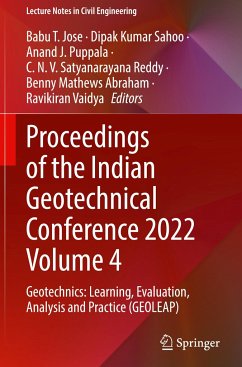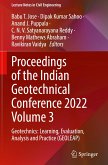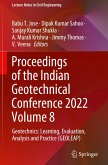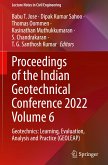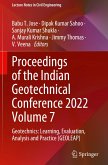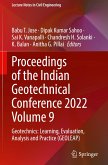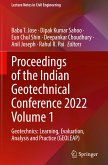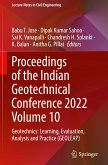Proceedings of the Indian Geotechnical Conference 2022 Volume 4
Geotechnics: Learning, Evaluation, Analysis and Practice (GEOLEAP)
Herausgegeben:Jose, Babu T.; Sahoo, Dipak Kumar; Puppala, Anand J.; Reddy, C. N. V. Satyanarayana; Abraham, Benny Mathews; Vaidya, Ravikiran
Proceedings of the Indian Geotechnical Conference 2022 Volume 4
Geotechnics: Learning, Evaluation, Analysis and Practice (GEOLEAP)
Herausgegeben:Jose, Babu T.; Sahoo, Dipak Kumar; Puppala, Anand J.; Reddy, C. N. V. Satyanarayana; Abraham, Benny Mathews; Vaidya, Ravikiran
- Gebundenes Buch
- Merkliste
- Auf die Merkliste
- Bewerten Bewerten
- Teilen
- Produkt teilen
- Produkterinnerung
- Produkterinnerung
This book comprises the select proceedings of the Indian Geotechnical Conference (IGC) 2022. The contents focus on recent developments in geotechnical engineering for a sustainable world. The book covers behavior of soils and soil-structure interaction, soil stabilization, ground improvement, and land reclamation, shallow and deep foundations, geotechnical, geological and geophysical investigation, rock engineering, tunneling and underground structures, slope stability, landslides and liquefaction, earth retaining structures and deep excavations, geosynthetics engineering, geo-environmental…mehr
Andere Kunden interessierten sich auch für
![Proceedings of the Indian Geotechnical Conference 2022 Volume 3 Proceedings of the Indian Geotechnical Conference 2022 Volume 3]() Proceedings of the Indian Geotechnical Conference 2022 Volume 3186,99 €
Proceedings of the Indian Geotechnical Conference 2022 Volume 3186,99 €![Proceedings of the Indian Geotechnical Conference 2022 Volume 8 Proceedings of the Indian Geotechnical Conference 2022 Volume 8]() Proceedings of the Indian Geotechnical Conference 2022 Volume 8208,99 €
Proceedings of the Indian Geotechnical Conference 2022 Volume 8208,99 €![Proceedings of the Indian Geotechnical Conference 2022 Volume 6 Proceedings of the Indian Geotechnical Conference 2022 Volume 6]() Proceedings of the Indian Geotechnical Conference 2022 Volume 6208,99 €
Proceedings of the Indian Geotechnical Conference 2022 Volume 6208,99 €![Proceedings of the Indian Geotechnical Conference 2022 Volume 7 Proceedings of the Indian Geotechnical Conference 2022 Volume 7]() Proceedings of the Indian Geotechnical Conference 2022 Volume 7208,99 €
Proceedings of the Indian Geotechnical Conference 2022 Volume 7208,99 €![Proceedings of the Indian Geotechnical Conference 2022 Volume 9 Proceedings of the Indian Geotechnical Conference 2022 Volume 9]() Proceedings of the Indian Geotechnical Conference 2022 Volume 9208,99 €
Proceedings of the Indian Geotechnical Conference 2022 Volume 9208,99 €![Proceedings of the Indian Geotechnical Conference 2022 Volume 1 Proceedings of the Indian Geotechnical Conference 2022 Volume 1]() Proceedings of the Indian Geotechnical Conference 2022 Volume 1186,99 €
Proceedings of the Indian Geotechnical Conference 2022 Volume 1186,99 €![Proceedings of the Indian Geotechnical Conference 2022 Volume 10 Proceedings of the Indian Geotechnical Conference 2022 Volume 10]() Proceedings of the Indian Geotechnical Conference 2022 Volume 10208,99 €
Proceedings of the Indian Geotechnical Conference 2022 Volume 10208,99 €-
-
-
This book comprises the select proceedings of the Indian Geotechnical Conference (IGC) 2022. The contents focus on recent developments in geotechnical engineering for a sustainable world. The book covers behavior of soils and soil-structure interaction, soil stabilization, ground improvement, and land reclamation, shallow and deep foundations, geotechnical, geological and geophysical investigation, rock engineering, tunneling and underground structures, slope stability, landslides and liquefaction, earth retaining structures and deep excavations, geosynthetics engineering, geo-environmental engineering, sustainable geotechnics, and landfill design, geo-hydrology, dam and embankment engineering, earthquake geotechnical engineering, transportation geotechnics, forensic geotechnical engineering and retrofitting of geotechnical structures, offshore geotechnics, marine geology and sub-sea site investigation, computational, analytical and numerical modeling, and reliability in geotechnical engineering. The contents of this book are useful to researchers and professionals alike.
Hinweis: Dieser Artikel kann nur an eine deutsche Lieferadresse ausgeliefert werden.
Hinweis: Dieser Artikel kann nur an eine deutsche Lieferadresse ausgeliefert werden.
Produktdetails
- Produktdetails
- Lecture Notes in Civil Engineering 479
- Verlag: Springer / Springer Nature Singapore / Springer, Berlin
- Artikelnr. des Verlages: 978-981-97-1752-1
- 2024
- Seitenzahl: 388
- Erscheinungstermin: 4. Juni 2024
- Englisch
- Abmessung: 241mm x 160mm x 26mm
- Gewicht: 817g
- ISBN-13: 9789819717521
- ISBN-10: 9819717523
- Artikelnr.: 69952207
- Herstellerkennzeichnung Die Herstellerinformationen sind derzeit nicht verfügbar.
- Lecture Notes in Civil Engineering 479
- Verlag: Springer / Springer Nature Singapore / Springer, Berlin
- Artikelnr. des Verlages: 978-981-97-1752-1
- 2024
- Seitenzahl: 388
- Erscheinungstermin: 4. Juni 2024
- Englisch
- Abmessung: 241mm x 160mm x 26mm
- Gewicht: 817g
- ISBN-13: 9789819717521
- ISBN-10: 9819717523
- Artikelnr.: 69952207
- Herstellerkennzeichnung Die Herstellerinformationen sind derzeit nicht verfügbar.
Dr. Babu T. Jose completed his B.Tech. from NIT Warangal in 1967 with Nehru Memorial Gold Medal, M.Tech. from IIT Madras in 1972 and Ph.D. from Cochin University of Science and Technology in 1990. He was a lecturer in NIT, Calicut, for 13 years (1967-1980). Currently, he is an emeritus professor at Cochin University of Science and Technology since 2004. Dr. Jose has commendable experience in research. He has published more than 200 research papers, and on the consultancy front, he has successfully completed more than 500 projects. On the administrative side, he was a principal at the School of Engineering, Cochin University, during 1980-1995 and a director of two engineering colleges from 1985 to 2004. Dr. Babu T Jose is the founder chairman of IGS, Kochi Chapter. He was the chairman of the organizing committee of IGC in 2011 and the chief editor of its proceedings. Dr. Dipak Kumar Sahoo has been a full-time faculty member since 2001, and currently a professor since 2009, in the School of Engineering, Cochin University of Science and Technology, Kochi. Prior to academics, he was working in the Fertilizers and Chemicals Travancore Limited, a Central Public Sector Company, in India for more than ten years as a consulting engineer to many public and private sector companies for setting up their green-field petrochemical complexes in different parts of India. He received his B.Sc. Engineering (Civil) from CET Bhubaneswar in 1987, M.Tech. in Construction Engineering and Management from Cochin University of Science and Technology in 1998, Ph.D. in Structural Engineering from the Indian Institute of Technology Roorkee in 2009 and LL.B. from the Cochin University of Science and Technology in 2015. Dr. Anand J. Puppala currently serves as A. P. Wiley and Florence Chair of Zachry Civil and Environmental Engineering at Texas A&M University and has been an associate director of Center for Infrastructure Renewal (CIR) since 2019. Dr. Puppala was the chair of Soil Mechanics section (AFS00) of the Transportation Research Board (TRB). He also chaired American Society of Civil Engineers (ASCE)'s Geotechnical Institute's (GI) "Engineering Geology and Site Characterization" committee and TRB committee on "Soil and Rock Instrumentation." Dr. Puppala is the current chair of ISSMGE's Technical Committee 307 on Sustainability in Geotechnical Engineering. He has given several keynotes and invited talks worldwide, including a prestigious ASCE GI Peck talk at 2020 GeoCongress Meeting held in Minneapolis, Minnesota. Dr. C.N.V. Satyanarayana Reddy is a professor of Civil Engineering at College of Engineering, Andhra University, Visakhapatnam, and has 29 years of teaching, research, and consultancy experience. His expertise and research interests are in the areas of reinforced soils, ground improvement, landfills, soil retention in excavations, deep foundations, and forensic geotechnical engineering. He obtainedB.Tech. (Civil Engg.) degree securing first rank from Nagarjuna University, M.Tech. (Geotechnical Engg.) degree from IIT Madras, M.E. (Structures) from Andhra University, and Ph.D. from NIT Warangal. He has guided 9 Ph.D. scholars and 105 M.Tech. Dissertations so far. He has more than 110 publications in various national and international journals and seminar and conference proceedings. He served as a director of Andhra University Development Centre during the period 2013-2017. Dr. Benny Mathews Abraham graduated from Regional Engineering College Calicut in 1982. He completed his M. Tech. from IIT Madras in 1984 and Ph. D. from Cochin University in the year 1994. He joined Cochin University as a lecturer in 1985 and became a professor in the year 2001. He was the head of Division of Civil Engineering, CUSAT, for 13 years and was the dean of Faculty of Architecture, CUSAT for three years. He was the chairman of Board of Studies and Academic Council at CUSAT. Heretired from Cochin University service in May 2020, and currently, he is the professor and head of the department at Albertian Institute of Science and Technology, Kalamassery. He has more than 80 publications out of which 25 are in peer-reviewed international journals. He won the IGS best research paper awards in 1989, 1991, and 2016. Mr. Ravikiran Vaidya, Principal Engineer of Geodynamics, has been instrumental in popularizing the concept of Deep Foundation Testing in India. He has created a deep foundation testing industry and today Geo Dynamics is India's premier testing company in this field. Jointly with Dr. Jaykumar Shukla, he has also indigenized and successfully demonstrated bi-directional load testing even for large-capacity monopiles which is yet another milestone for the country. Thermal integrity profiling and instrumentation have been his other contributions. He has worked on almost all the prestigious projects in the country and in more than 20 countries worldwide. He has written more than 21 technical papers in conferences and journals. He was the co-editor of the Indian Geotechnical Conference, Vizag, in 2020. He has guided several master's theses, and his work has been used by students in their Ph.D. thesis.
Natural Rubber Latex for Reducing Soil Brittleness Induced by Post-compaction Moisture Reduction.- Study of Reinforced Soil Embankment Supported on Stone Column Improved Ground.- Characterization of Soil-jarosite Mixes for Geopolymer Based Soil Stabilization.- An Experimental Investigation and Numerical Modeling of Glass Fiber-reinforced Expansive Subgrade Soil with Alkaline Stabilizer.- Stabilisation of Kuttanad Soil Using Terrasil Nanochemical and Ggbs.- Stabilization of Black Cotton Soil Using Red Mud, Phosphogypsum and Lime.- A Study on Recycled Plastic Pins as Micropile in Stabilization of Cohesive Slope.- Effect of Fly Ash and Synthetic Fibres on the Desiccation Cracking of Expansive Clay.- Performance Assessment of Waste Plastic Inclusions on the Strength of Expansive Clays Blended with Vitrified Polish Waste and Lime.- Performance of Stone Column Subjected to Dynamic Loading in Sand Bed.- Utilization of Brine Sludge to Improve the Strength and Compressibility Characteristics ofSoft Clays.- Application of Biopolymers in Geotechnical Engineering Practices: An Eco-friendly Approach.- Gondegaon Coal Mine Overburden Dump Stabilization by Using Industrial By-product.- Comparison of Different Ground Improvement Techniques for the Road Construction over Kuttanadu Clay Strata.- Efficacy of Cross-linking of Biopolymers in Soil Stabilization.
Natural Rubber Latex for Reducing Soil Brittleness Induced by Post-compaction Moisture Reduction.- Study of Reinforced Soil Embankment Supported on Stone Column Improved Ground.- Characterization of Soil-jarosite Mixes for Geopolymer Based Soil Stabilization.- An Experimental Investigation and Numerical Modeling of Glass Fiber-reinforced Expansive Subgrade Soil with Alkaline Stabilizer.- Stabilisation of Kuttanad Soil Using Terrasil Nanochemical and Ggbs.- Stabilization of Black Cotton Soil Using Red Mud, Phosphogypsum and Lime.- A Study on Recycled Plastic Pins as Micropile in Stabilization of Cohesive Slope.- Effect of Fly Ash and Synthetic Fibres on the Desiccation Cracking of Expansive Clay.- Performance Assessment of Waste Plastic Inclusions on the Strength of Expansive Clays Blended with Vitrified Polish Waste and Lime.- Performance of Stone Column Subjected to Dynamic Loading in Sand Bed.- Utilization of Brine Sludge to Improve the Strength and Compressibility Characteristics ofSoft Clays.- Application of Biopolymers in Geotechnical Engineering Practices: An Eco-friendly Approach.- Gondegaon Coal Mine Overburden Dump Stabilization by Using Industrial By-product.- Comparison of Different Ground Improvement Techniques for the Road Construction over Kuttanadu Clay Strata.- Efficacy of Cross-linking of Biopolymers in Soil Stabilization.

